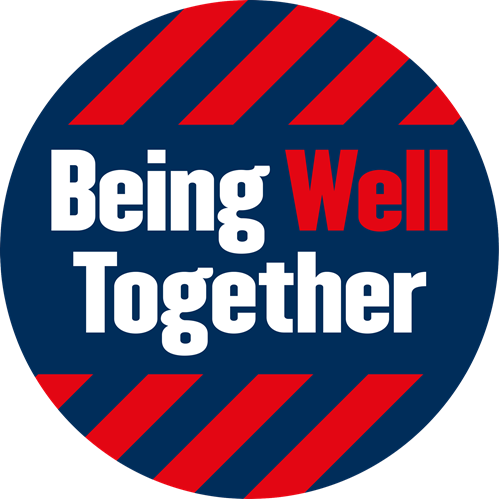The British Safety Council will shortly be launching a new programme to help employers improve the mental and physical wellbeing of their workers.
Features
Introducing Being Well Together
The British Safety Council is rightly proud of its heritage. We look back to our foundation over 60 years ago by the inspirational James Tye and we see an unbroken thread from that time to this.
James is rightly famous for his early campaigns on seatbelts, flammable nightwear for children and life jackets for passengers on boats. He is known for calling for leaders to set an example, at the very highest level – he was not shy about telling the Queen to wear a riding helmet. It was James’ perseverance that led to Lord Robert’s inquiry into workplace health and safety and its ultimate fruit, the Health and Safety at Work Act.
During the past few months, we have wondered aloud what James would have said in response to coronavirus. We can’t know for certain, but I suspect he would have been early to call for face masks in public places, and vocal in demanding that politicians and other public figures set a good example. I suspect he would be creating posters (or more likely memes) on home working and display screen equipment (DSE) and creatively reminding people to stay two metres apart. He casts a long shadow, as people who are ahead of their time often do.
 Photograph: iStock/DjelicS
Photograph: iStock/DjelicS
And he was truly ahead of his time when it comes to the importance of workplace wellbeing. Back in the 1980s he recognised that workplace stress was increasingly damaging people’s health and wellbeing and he founded the British Wellness Council to produce messages on how to stay physically and mentally healthy. Being Well Together, a new programme soon to be launched by the British Safety Council, is in the best traditions of the British Safety Council, but it also brings together the latest thinking from experts and draws on the experience of our sister organisation Mates in Mind.
We hope that James Tye would share our excitement at its launch. We know that he would share our passion for helping organisations to champion employee wellbeing and to put it at the heart of how they enable their workforce to thrive.
Wellbeing – what are we talking about?
We have defined wellbeing as “an individual’s ongoing state which enables a person to thrive”. Definitions and matrices when applied to people are not exact, but we have adopted the same five domains of wellbeing as used by CIPD: health, good work, values, collective/social and personal growth.
Employees need to be healthy to thrive, which means they need to be safe from accidental harm or from long-term damage over time. We all understand the need to protect workers from slips and trips or from exposure to harmful dust, and we are growing in our appreciation of subtler health risks, like exposure to environmental air pollution over time.
Our understanding of the importance of good mental health has vastly improved since the 1950s, and in many workplaces where physical risks are low (e.g. offices) employers will be thinking more about employees’ mental wellbeing than any other factor. Work which helps people to thrive must include a good workspace, meaningful autonomy, fair pay and good management. And to thrive workers will want to work somewhere which reflects their values – employers have been slow to recognise that diversity in the workforce is not about fairness for individuals alone (important though that is), but about creating a diverse workforce that benefits every worker.
It flows from this that employees need a voice, to be able to communicate collectively and to be part of the decision-making process. Finally, we all need positive affirmation, the chance to shine and to be creative and to be praised for good work. Wellbeing should foster a culture of lifelong learning and self-improvement, as well as good teamwork and shared endeavour.
The organisational benefits
The benefits of wellbeing can also be broken down into those things that are positive for the individual and for the whole organisation. Happy workers are more productive, more effective and more likely to be consistent in their performance. They will be more likely to stay in post, saving recruitment costs and increasing the return on investment in each hire. Overall wellbeing means fewer days off sick, but it also means reduced presenteeism and leaveism – healthier employees making their best contribution for more of the time, doing the job they want to do and for which they have been contracted.
A happy workforce will strengthen an organisation’s reputation, just as employers who treat workers badly can see their image badly tarnished. Implementing a comprehensive wellbeing programme is good for workers, which is reason enough to do it. But it is also good for your organisation. It happens to be true that what is good for people is good for business.
Being Well Together
This new programme brings all the disparate aspects of workplace wellbeing under one umbrella helping people to move their workforce from one which is sporadically unwell and underperforming to one which is thriving, creating businesses that can thrive in turn. The challenge for most organisations is that wellbeing is multidimensional and multifaceted – and an effective programme needs to be ambitious in scope to deliver real outcomes.
The good news is that although the combined impact of multiple interventions has significant positive impact, the individual interventions themselves are relatively simple and modest in scope. Our programme sets out appropriate, co-ordinated and sustained interventions, including elements that we are all familiar with: engagement, training, benchmarking, company-wide resources and best practice.
Built around the timeless health and safety principles of ‘Plan, do, check, act’, this programme sets out a step-by-step approach to help organisations assess their current requirements, evaluate the gaps, develop a strategy, implement, measure and sustain. Of course, if it were easy then everybody would do it already – we recognise the challenges and we have built in resilience to overcome them.
Our programme starts from the premise that organisations are time poor and that resource is always finite – especially in these uncertain times. We know how to embed wellbeing, so that it is not an add-on that can be dispensed with when events overtake us. Our resources are digital by default, geared to an increasingly flexible workforce. We can also help to engage employees, so that you can win them over to new ways of working.

Seize the day
Earlier this year, when coronavirus was barely registering on our consciousness, we were planning our major new offering on worker wellbeing. We were not to know that 2020 was going to be a year in which employers and employees were put under unforeseen stresses.
We also know that as we look ahead the future is very uncertain. The peculiar circumstances of the lockdown could have been a reason to delay, but instead we have accelerated our work to get Being Well Together ready as soon as we can to support employers as the lockdown ends.
This autumn, as people slowly return to a semblance of normality, workers will be reflecting on the experience of more workplace flexibility, more time with their families, as well as financial uncertainty and anxiety about the future. Some managers and business leaders will be tempted to focus solely on the bottom line, to push on through to 2021 and then take stock.
They would be mistaken. Now is the time to embrace worker wellbeing, to demonstrate commitment to the workforce and to champion employee wellbeing. It will be the employers who want their workforce to thrive that come through this global pandemic stronger than before.
Jigna Patel is managing director – qualifications, digital and subscriptions, at the British Safety Council.
FEATURES

How to mitigate the hearing loss cost escalation tsunami
By Peter Wilson, Industrial Noise and Vibration Centre (INVC) on 06 February 2026
Employers need to adopt the latest and most effective noise risk evaluation and management measures, or face rapidly-rising compensation claims for noise-induced hearing loss at work.

Young drivers and work-related road risk: why employers must act now
By Simon Turner, Driving for Better Business on 06 February 2026
Young drivers have a higher risk of being involved in road collisions due to factors such as their inexperience, so when employing them to drive for work, it is vital they receive the right support to help them grow into safe professionals behind the wheel.

Financial stress: why and how it affects workplace safety
By Chloe Miller, freelance writer on 06 February 2026
Financial worries can lead to cognitive impairment that increases the risk of workplace accidents, so it’s essential employers provide financial education and confidential support for workers who may be struggling with problems like debt and unexpected living expenses.



